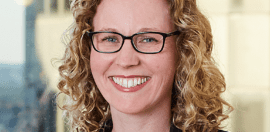Purpose gets you through

3 March 2020 at 8:08 am
In the latest in our NFP leadership series, Lea Corbett and Amanda Cornwall from Map consulting group ask Dr Briony Dow, executive director of the National Ageing Research Institute, about her experience of leading a NFP.
Dr Briony Dow came across the National Ageing Research Institute (NARI) in 2003 after a career as a social worker and a return to study to complete a Masters and PhD. Seventeen years later, including around five years at the helm, Dow is as enthusiastic as ever about the work that NARI undertakes and the difference it makes to others.
Despite a heavy workload, Dow says that the main thing that gets you through in this business is your purpose.
“Here the bottom line isn’t about shareholder profit. It’s about making the lives of older people better,” she says.
NARI conducts research into the ageing body and mind, including the social aspects of ageing – culture, family relationships – and uses this research to shape health promotion, service provision and policy development concerning older people.
NARI – Vitals
Sector: Older people
Purpose: To improve the life and health of older people through research and evidence-based practice
Annual budget: $4 million
Staff: Around 50
“After 40 years, NARI’s work remains at the forefront of ageing research, and it has been replicated across Australia and internationally,” Dow says.
As a small research organisation, volunteers are crucial to the success of NARI. According to Dow, they provide advice on what they should research and how to make the outcomes meaningful for older people.
“They also participate in our research, providing data, participating in trials and enabling us to test new ideas. I am really not sure where we would be without them,” Dow says.
“We recently completed a volunteer-led pilot study aimed at improving outcomes for people who are living in nursing homes and who are depressed. We trained our volunteers who then visited the residents once a week for six to eight weeks. The program had great outcomes for the residents.”
So, what sorts of challenges does the leader of a small research organisation like NARI face?
Never neglect cyber security
NARI’s IT system was hacked several years ago.
“There was no issue with confidential data getting shared,” Dow hastens to add.
“But it meant a lot of data had to be re-entered and some things, like templates for HR, had to be redesigned from scratch.
“It happened while we were transferring the contract for our IT services from one company to another, so we were vulnerable. As a data-based organisation it was devastating.”
As the CEO, Dow had to explain to staff and external stakeholders what had happened. This had to be done directly and immediately, preferably face to face, and everyone needed a chance to express what it meant to them, to debrief and work out solutions.
It was full-on for several weeks and the fall out was felt even longer as data had to be re-entered and the costs of that calculated and attributed over the next few months.
“The lesson was back-up, back-up, back-up,” Dow says.
“Actually we had three back-up systems but two failed and the third was partially hacked into. We now have much better IT security.”
Dow also says that at times like that she has been particularly thankful for a very supportive executive team, including her deputy, and a very good board.
“But I’m very much aware that I bear the ultimate responsibility for responding to challenges of this nature,” she says.
Funding is another perennial concern for NARI, as with many in the NFP sector.
The research sector relies on “soft” money – purpose specific grants.
There’s little permanent funding, which Dow says makes her job of managing income and staffing difficult at times.
“I feel a great sense of responsibility towards my staff, who all have families to support and mortgages to pay. This drives me to make every effort to make my organisation sustainable, talking to government and philanthropic bodies about how they can make a difference through NARI’s work,” she says.
Aged Care Royal Commission
Another thing that Dow worries about is how to ensure NARI’s research makes a difference to people who are ageing. With a mission to improve the life and health of older people through research and evidence-based practice, NARI’s research provides insights into how to “do” ageing well and deliver aged care services that would make Australia world leaders in the field.
“Then when I see the reports coming to light as part of the Royal Commission into Aged Care Quality and Safety I become alarmed,” she says.
“Despite our great research, it so often hasn’t been put into practice.
“There are many good practices and models for residential aged care services that don’t cost anything to implement. For example, dementia care facilities are typically noisy and busy, which can exacerbate agitation in residents. One of our research partners switched to recruiting staff based on their emotional intelligence. The outcomes for residents were dramatic in reducing noise and creating a calm environment – good for staff, families and residents.”
Dow and her staff look for every opportunity to spread the word. She is an honorary professor in the School of Global and Population Health at the University of Melbourne, and has been involved in their online Master of Ageing. NARI promotes its research outcomes and awards through its newsletter for external stakeholders, as well as through conferences and other publications.
Internally, Dow likes to celebrate her staff, volunteers and the institute’s history. Individual staff achievements are honored through their NARI news and at staff meetings.
“A ‘thank you’ day for volunteers is held annually to celebrate the amazing contribution they make to our research, and we recently marked our 40th anniversary with a reception for 100 guests hosted by the Hon Linda Dessau AM Governor of Victoria and His Honour Judge Anthony Howard at Government House,” she explains.
“We also have an annual International Women’s Day event at Coombe Cottage, home of the late Nellie Melba, where we celebrate the achievements of our women researchers.
“We celebrate as often as we can.”
So, what advice would she give to people aspiring to be a CEO of a not for profit?
Passion and humour
“I would say you need to have a genuine interest and passion for the area that you’re working in. I’m passionate about ageing well and quality aged care services so I feel very privileged to have this role,” she says.
“You need the ability to form relationships with many different stakeholders – from staff to government, industry, and your wider constituency. In managing these relationships, you need to develop the ability to be flexible without diverting from your long-term path.
“You must build your resilience – you need a sense of humour to survive the tough days. So, don’t take yourself too seriously would be my advice.”
Finally, we ask all the CEOs in this leadership series to look through an even broader lens and tell us what they would do if they were premier of Victoria for a year – specifically what they would stop, start and keep?
NARI works at a national level, so Dow says she would prefer to be prime minister for a year.
“I think the Royal Commission into Aged Care Quality and Safety is a great initiative. It is giving people who have experienced aged care services the opportunity to give feedback and suggest new ideas. The commissioners are consulting with a range of experts, including NARI staff, about what works and doesn’t work well in aged care,” she says.
“I really think this is an opportunity to transform our aged care system and truly make it one of the best in the world. It will require greater investment by government and a pathway to evidence-based best practice for all aged care providers.”
One thing she would say to state government is to build neighborhoods and infrastructure that are friendly for older people.
“The new accessible tram stops in Melbourne, for example, have resulted in less tram stops that are further apart. If you’re an older person or anyone with limited mobility you would understand that the stops are now too far apart,” she says.
“Also, our trams take off too fast, before people are seated, creating a falls risk. Let’s stop that.”
This article is the third in a six-part NFP Leadership series.
Map consulting group initiated this series of interviews with not for profit CEOs to share their insights about the role and support the success of leaders in the sector, current and emerging.
See also:








